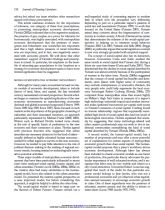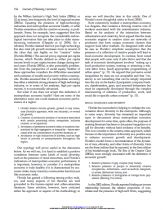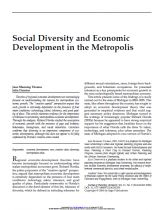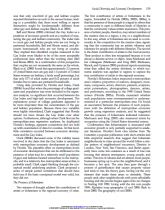Projekt: Social Diversity and Economic Development in the Metropolis
Skrýt detaily | Oblíbený- Kvalita:87,0 %
- Typ:Projekt
- Univerzita:Univerzita Tomáše Bati ve Zlíně
- Fakulta:Fakulta managementu a ekonomiky
- Kategorie:Ekonomika
- Podkategorie:Management
- Předmět:Management
- Autor:eliseus
- Rozsah A4:17 strán
- Zobrazeno:977 x
- Stažené:0 x
- Velikost:0,1 MB
- Formát a přípona:PDF dokument (.pdf)
- Jazyk:anglický
- ID projektu:2948
- Poslední úprava:27.03.2014
Regional economic-development theorists have
become increasingly focused on understanding what
makes metropolitan economies grow. Richard Florida,
the prime proponent of the “creative capital” perspective,
argued that metropolitan economic development
is extremely dependent on the presence of four main
conditions: technology, talent, tolerance, and good
quality of place. Particularly noteworthy in Florida’s
discussion is the third element of this list, tolerance of
diversity, which he defined as including tolerance for
different sexual orientations, races, foreign-born backgrounds,
and bohemian occupations. He presented
tolerance as a key prerequisite for economic growth in
the new, technologically based metropolitan economy.
This article presents some of the findings of a study
carried out for the state of Michigan in 2004-2005. This
state, like others throughout the country, has sought to
adopt an economic development theory that was
grounded in empirical evidence and that could suggest
necessary policy directions.
become increasingly focused on understanding what
makes metropolitan economies grow. Richard Florida,
the prime proponent of the “creative capital” perspective,
argued that metropolitan economic development
is extremely dependent on the presence of four main
conditions: technology, talent, tolerance, and good
quality of place. Particularly noteworthy in Florida’s
discussion is the third element of this list, tolerance of
diversity, which he defined as including tolerance for
different sexual orientations, races, foreign-born backgrounds,
and bohemian occupations. He presented
tolerance as a key prerequisite for economic growth in
the new, technologically based metropolitan economy.
This article presents some of the findings of a study
carried out for the state of Michigan in 2004-2005. This
state, like others throughout the country, has sought to
adopt an economic development theory that was
grounded in empirical evidence and that could suggest
necessary policy directions.




